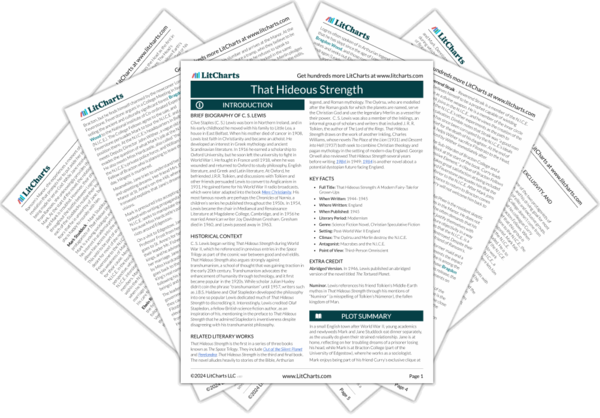Merlinus Ambrosius (Merlin) Quotes in That Hideous Strength
She did not doubt that the eldils existed; nor did she doubt the existence of this stronger and more obscure being whom they obeyed…whom the Director obeyed, and through him the whole household […]. If it had ever occurred to her to question whether all these things might be the reality behind what she had been taught at school as “religion,” she had put the thought aside. The things belonged, for her, to different worlds. On the one hand, terror of dreams, rapture of obedience, […] and the great struggle against an imminent danger; on the other, the smell of pews, horrible lithographs of the Saviour […]. But this time, if it was really to be death, the thought would not be put aside. […] Maleldil might be, quite simply and crudely, God. There might be a life after death: a Heaven: a Hell.
“Merlin is the reverse of Belbury. […] He is the last vestige of an old order in which matter and spirit were, from our modern point of view, confused. For him every operation on Nature is a kind of personal contact, like coaxing a child or stroking one’s horse. After him came the modern man to whom Nature is something dead––a machine to be worked, and taken to bits if it won’t work the way he pleases. Finally, come the Belbury people, who take over that view from the modern man unaltered and simply want to increase their power by tacking on to it the aid of spirits […]. In a sense, Merlin represents what we’ve got to get back to in some different way.”
Therefore [Wither] knew that everything was lost. It is incredible how little this knowledge moved him. It could not, because he had long ceased to believe in knowledge itself. What had been in his far-off youth a merely aesthetic repugnance to realities that were crude or vulgar, had deepened and darkened, year after year, into a fixed refusal of everything that was in any degree other than himself. […] He had willed with his whole heart that there should be no reality and no truth, and now even the imminence of his own ruin could not wake him. The last scene of Dr. Faustus where the man raves and implores on the edge of Hell is, perhaps, stage fire. The last moments before damnation are not often so dramatic.

Merlinus Ambrosius (Merlin) Quotes in That Hideous Strength
She did not doubt that the eldils existed; nor did she doubt the existence of this stronger and more obscure being whom they obeyed…whom the Director obeyed, and through him the whole household […]. If it had ever occurred to her to question whether all these things might be the reality behind what she had been taught at school as “religion,” she had put the thought aside. The things belonged, for her, to different worlds. On the one hand, terror of dreams, rapture of obedience, […] and the great struggle against an imminent danger; on the other, the smell of pews, horrible lithographs of the Saviour […]. But this time, if it was really to be death, the thought would not be put aside. […] Maleldil might be, quite simply and crudely, God. There might be a life after death: a Heaven: a Hell.
“Merlin is the reverse of Belbury. […] He is the last vestige of an old order in which matter and spirit were, from our modern point of view, confused. For him every operation on Nature is a kind of personal contact, like coaxing a child or stroking one’s horse. After him came the modern man to whom Nature is something dead––a machine to be worked, and taken to bits if it won’t work the way he pleases. Finally, come the Belbury people, who take over that view from the modern man unaltered and simply want to increase their power by tacking on to it the aid of spirits […]. In a sense, Merlin represents what we’ve got to get back to in some different way.”
Therefore [Wither] knew that everything was lost. It is incredible how little this knowledge moved him. It could not, because he had long ceased to believe in knowledge itself. What had been in his far-off youth a merely aesthetic repugnance to realities that were crude or vulgar, had deepened and darkened, year after year, into a fixed refusal of everything that was in any degree other than himself. […] He had willed with his whole heart that there should be no reality and no truth, and now even the imminence of his own ruin could not wake him. The last scene of Dr. Faustus where the man raves and implores on the edge of Hell is, perhaps, stage fire. The last moments before damnation are not often so dramatic.











